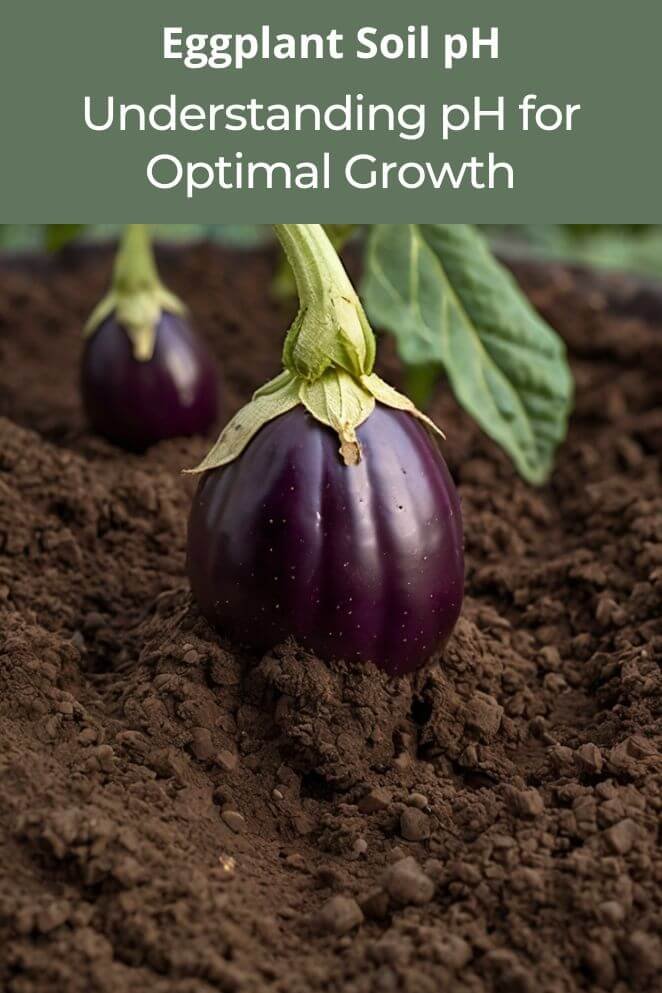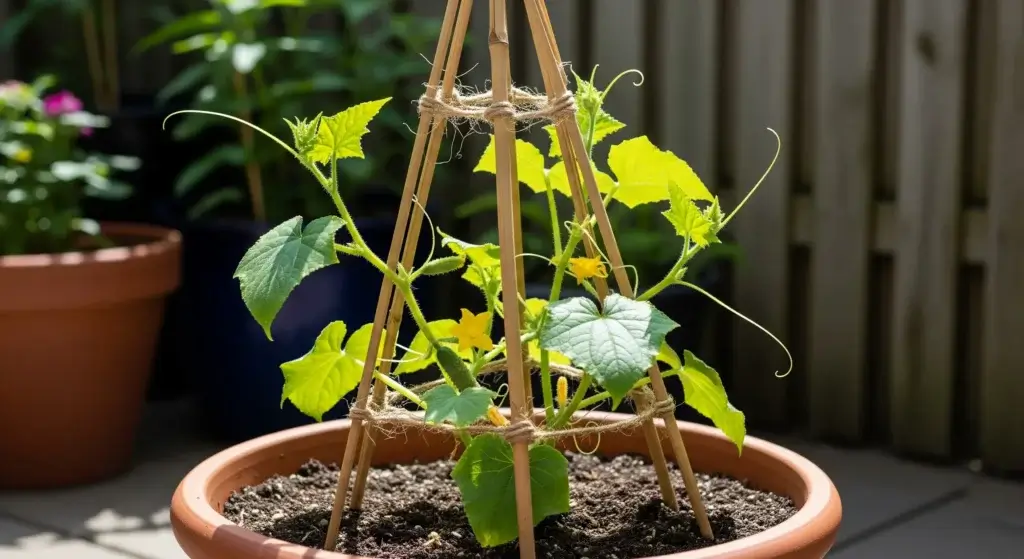
Growing eggplants (Solanum melongena) in your garden can be a truly rewarding experience.
However, to ensure your plants thrive and produce a plentiful harvest, it’s essential to pay close attention to a few key factors.
One of the most important is soil pH.
Eggplants are somewhat sensitive to how acidic or alkaline their soil is, and keeping the pH at the right level can greatly affect their health and productivity.
In this guide, we’ll explore why soil pH is important for eggplants, how to test and adjust it, and how to create the ideal environment for your plants to flourish.
Why Soil pH Matters for Eggplant
Soil pH measures how acidic or alkaline your soil is, and it plays a vital role in the overall health of your eggplant plants.
Because eggplants are heavy feeders, the pH level directly impacts nutrient availability, root health, and how susceptible they are to diseases.
Nutrient availability
Plants absorb nutrients from the soil through their roots, and soil pH significantly affects how accessible essential nutrients—like nitrogen, phosphorus, and potassium—are.
If the pH is too low (too acidic) or too high (too alkaline), the plants may struggle to access these nutrients, even if they are present in the soil.
For instance, when the pH drops below 5.5, vital nutrients like phosphorus become less available.
On the other hand, if the pH rises above 7.0, it can block important micronutrients like iron and manganese, leading to deficiencies that can hinder plant growth.
- Read also: Identifying and Combating Bacterial Wilt in Eggplant Plants
- Read also: Identifying and Managing Common Eggplant Pest And Diseases
Root health
Eggplant roots are sensitive to their soil environment.
When the soil is too acidic or alkaline, root development can be stunted, which reduces the plant’s ability to absorb water and nutrients.
This can lead to symptoms like slow growth, yellowing leaves, and poor fruit production.
Keeping the soil pH within the ideal range ensures that the roots stay healthy and functional.
Disease susceptibility
Soil pH also influences microbial activity, which affects the likelihood of plant diseases.
A balanced pH promotes the growth of beneficial microorganisms that help protect eggplants from soil-borne diseases such as Verticillium wilt and Fusarium wilt.
In contrast, improper pH levels can create conditions that favor harmful pathogens, increasing the risk of disease.

Ideal Soil pH Range for Eggplant
The best soil pH range for growing eggplants is between 5.5 and 6.5.
Within this range, eggplants can absorb nutrients effectively, and their roots are less likely to experience stress or develop diseases.
If your soil’s pH is outside of this range, it’s important to make adjustments to create the best possible growing conditions for your plants.
This will help ensure that your eggplants thrive and produce a healthy harvest.
Testing Your Soil pH
Before you start planting eggplants, it’s important to test the pH of your soil.
Fortunately, there are several easy methods to find out your garden soil’s pH level.
Methods for testing soil pH
pH testing kits
You can find these kits at most garden centers.
They are affordable and simple to use.
Usually, you mix a small amount of soil with a special liquid solution or use test strips that change color according to the pH level.
Electronic pH meters
These devices give you a precise reading of your soil’s pH.
Just insert the probe into moist soil, and the meter will display the pH level.
Soil testing services
For the most thorough results, consider sending a soil sample to a professional testing service, which is often available through local agricultural extension offices.
This service will not only provide a pH reading but also offer detailed information about soil nutrients and structure.
Interpreting soil pH results
After testing your soil, it’s crucial to understand the results.
If the pH is within the ideal range of 5.5 to 6.5, your soil is suitable for planting eggplants.
If the pH is too low (below 5.5) or too high (above 6.5), you will need to make some adjustments to create the best growing conditions for your plants.

Adjusting Soil pH
If your soil’s pH is not within the ideal range for growing eggplants, you can make adjustments gradually.
Whether you need to raise or lower the pH, it’s important to do so slowly and keep an eye on the changes to prevent stressing your plants.
Raising soil pH
If your soil is too acidic (below pH 5.5), adding lime is the most common way to increase the pH.
Lime comes in different forms, such as:
- Agricultural lime: Also known as calcium carbonate.
- Dolomitic lime: Contains both calcium and magnesium.
The amount of lime you need depends on your soil type.
Sandy soils generally require less lime than clay soils.
It’s best to mix the lime into the soil several months before you plan to plant, giving it time to raise the pH.
Lowering soil pH
If your soil is too alkaline (above pH 6.5), you can lower the pH using sulfur or organic materials like peat moss.
Here are some options:
- Elemental sulfur: This is the most effective method, but it works slowly, so it’s best to apply it in the fall before planting in spring.
- Ammonium sulfate: This is another option that can gradually lower soil pH over time.
Gradual adjustments
Making gradual changes is essential.
Rapid adjustments can cause nutrient imbalances and stress for your eggplants.
It’s a good idea to retest your soil a few weeks after making changes to see how things are progressing and to ensure you don’t overcorrect.
Maintaining Optimal pH

Getting the right pH for your eggplants is just the beginning; keeping it steady is just as crucial.
Regular testing, managing organic matter, and caring for nutrients will help ensure your soil remains in the ideal range for healthy eggplant growth.
Regular testing
It’s wise to test your soil pH at least once a year, especially if you’ve made any adjustments or if you notice your plants aren’t doing well.
Soil pH can change over time due to factors like rain, irrigation, and the growth of your plants.
Keeping an eye on it will help you spot any problems before they become serious.
Organic matter
Adding organic matter, such as compost or well-rotted manure, is beneficial for buffering soil pH and improving soil structure.
Organic matter enhances water retention in sandy soils and helps with drainage in clay soils, creating a more balanced environment for your eggplants to thrive.
Nutrient management
Proper fertilization is key to maintaining your soil’s pH.
Using too many certain fertilizers, especially those high in nitrogen, can lead to soil becoming more acidic over time.
Opting for organic, balanced fertilizers or slow-release options can help prevent this issue while ensuring your eggplants receive the nutrients, they need to grow strong and healthy.
- Read also: The Ultimate Guide: How to Grow Eggplant in Containers
- Read also: 10 Different Types of Eggplant You Should know
Final Thoughts
Eggplants are a rewarding and beautiful addition to any garden, but to grow them successfully, understanding and managing soil pH is essential.
By ensuring your soil is in the ideal pH range of 5.5 to 6.5, you’ll promote better nutrient uptake, healthier root systems, and reduce the risk of disease.
With regular testing and small adjustments as needed, you can maintain an optimal environment for your eggplants, ensuring a healthy, productive harvest season after season.



